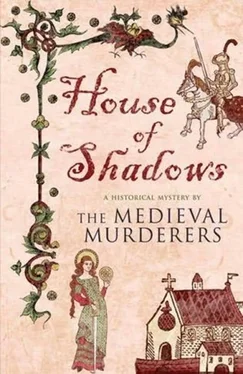‘The prior says that today all these people who were with Christina will be here to attend the funeral tomorrow,’ replied John.
That morning he had asked Robert Northam about the disposal of the body and had been told that the Beaumonts had already requested that Christina be interred in the priory cemetery, as ten days after death it was already impracticable to take the remains back to Derbyshire.
‘I will question them all in turn and try to get some sense of their feelings for the victim and where they were the night on which she was killed,’ he grimly told his clerk. ‘And today I’m going to twist a few arms in this place, see if I can squeeze some information from the Cluniacs.’
Knowing of Gwyn’s fondness for kitchens, he told the big Cornishman to haunt the servants’ domain and see if any useful gossip could be gleaned. The more menial tasks in a religious house like Bermondsey were carried out both by lay brothers, who, though they had taken no vows, wore the habit and the tonsure, as well as by ordinary servants, who either lived in the priory or came in daily from nearby cottages. Gwyn, an amiable but cunning fellow, was adept at befriending these lower ranks of society and could be trusted to ferret out any local scandals.
Thomas de Peyne had a similar gift, but one that worked best on clerks and priests like himself. Though now restored to grace as a priest, he had spent three years in the purgatory of being unfrocked, after a false accusation of indecent behaviour with a girl pupil in the cathedral school at Winchester. Before being reinstated, he had on a number of occasions helped the coroner by masquerading as a priest to worm his way into the confidence of various ecclesiastics. John now sent him on a similar expedition around the priory, a task in which Thomas revelled, as it allowed him to steep himself in the atmosphere and rituals of a religious house. He made first for the church, to attend vespers, then paraded around the cloister, talking to some of the monks as they perambulated around the garth.
Meanwhile, de Wolfe went to the dormitory and sought out Brother Ferdinand and made several requests, the first of which was a room in which to interview witnesses, and the second a view of the chambers in which Christina de Glanville had been lodged. The olive-complexioned monk took him along from the cubicle where John slept, to the head of the stairs and, with a key selected from a large ring hanging on his girdle, opened a door on the other side of the upper landing.
‘This is where she resided, together with her friend Margaret and their two maids,’ he said in Norman-French that carried a tinge of an accent that John guessed was the Langue d’Oc of southern France. He stood aside to let the coroner into a short corridor with two doors. Each opened into a vestibule that had a mattress, which opened into a larger room with better furnishings, the palliasses being raised on low plinths, with several tables and some leather-backed folding chairs, as well as tall cupboards for clothing.
‘This first one was where Lady Christina stayed and in the next was her friend, Mistress Courtenay. Their tirewomen slept in the outer part,’ added Ferdinand somewhat needlessly. ‘All the more important guests ate in a separate dining room near the inner gate, where further accommodation is situated.’
De Wolfe looked around the rooms and saw no signs of occupation. ‘What happened to her possessions, her clothing and personal effects?’
‘Her guardians, the Beaumonts, took everything last week. They are lodged near Bishopsgate, I understand, but I had a message from the prior’s secretary this morning to say that they are returning here tonight, ready for the funeral tomorrow.’
Ferdinand ushered de Wolfe out and locked up, then took him down to the ground floor of the cellarer’s building, where one of the small offices next to the guests’ refectory was given to him for an interview room. A bare cell with a shuttered window-opening, it had a table, a bench and two hard chairs.
‘I will see that a charcoal brazier is brought in when you need to use this, Sir John,’ offered the monk and made as if to leave the coroner to his own devices.
‘Wait a moment,’ commanded de Wolfe. ‘I need to speak to everyone who was in contact with the dead girl, and that includes you.’
Ferdinand stopped and slowly returned to the centre of the room. ‘There is little I can tell you, sir,’ he said quietly, the dark eyes in his almond-shaped face searching the forbidding features of the coroner.
‘Did she seem happy and excited at the prospect of her wedding? To most young women, this would be the most important day of her life.’
The monk remained impassive. ‘I really cannot say, coroner. She did not appear to be effusive over it, but I had little chance to observe her.’
‘When did you last see her?’
‘At the evening meal on that day. I usually look in on the small dining room set aside for special guests to check that all is well. The whole party was there, eating and drinking, including Lady Christina.’
‘Was Jordan de Neville there?’
‘He was. He ate his supper and later went back to Southwark with his squire.’
De Wolfe was hard put to think of any more questions for this silent man, but he tried a new tack. ‘Tell me, does Brother Ignatius have any peculiarities, so to speak? An unwelcome comment fell from his lips in the basement when we were examining the corpse.’
John expected another stonewall denial, but surprisingly Ferdinand’s impassive face creased into a smile.
‘Ah, you mean his strange obsession?’ he asked. ‘My fellow monk is something of a mystic. He regularly sees devils, angels and witches, though he is harmless enough and is an excellent support for our good prior.’
The coroner scowled at this rather dismissive opinion about a weird streak in the chaplain. ‘What does that have to do with the dead lady?’ he demanded.
Ferdinand spread out his hands, palms upwards. ‘He was convinced that she was a witch, sir! He claimed that she was left-handed, had a fondness for the storeroom cats and had long lobes to her ears or some such nonsense. He often made strange claims about visitors – and even our own inmates. He was convinced that our lay brother who used to tend the pigs was a reincarnation of Pontius Pilate!’
‘What happened to him?’ growled de Wolfe.
‘He drowned in the marshes outside last year,’ replied Ferdinand blandly.
Further questions produced nothing of use and the monk departed, leaving John sitting in irritable frustration at his table. A servant brought in an iron brazier in which charcoal glowed dully, sending a moderate heat into the room, together with some acrid fumes. In spite of the warmth, John felt chilled and, though of an unimaginative nature, he realized that where he sat was just above where the corpse of Christina de Glanville lay in her box of ice. Eventually he rose and, with an illogical feeling of relief, left the room and went across the cloister to the prior’s house, where he found Ignatius in his little office, busy writing on a scroll of parchment. He stood over the secretary and spoke without any preamble.
‘I understand that you had certain convictions about Lady Christina. Is that true?’
The lean monk stared up at him, a sullen expression on his face. ‘I don’t know what you mean, Sir John,’ he answered gruffly.
‘You thought she was a witch,’ snapped the coroner. ‘Did you do her any harm?’
Ignatius jumped up, his sallow cheeks suddenly flushed. ‘She was an acolyte of He with the Cloven Hooves!’ he brayed. ‘But I did nothing to her; it was not my place. God will settle all such matters on the Day of Judgement!’
‘Are you sure that you didn’t give Him a helping hand?’ suggested John, thrusting his menacing face closer to the monk’s. ‘Where were you late on the night when she went missing?’
Читать дальше












